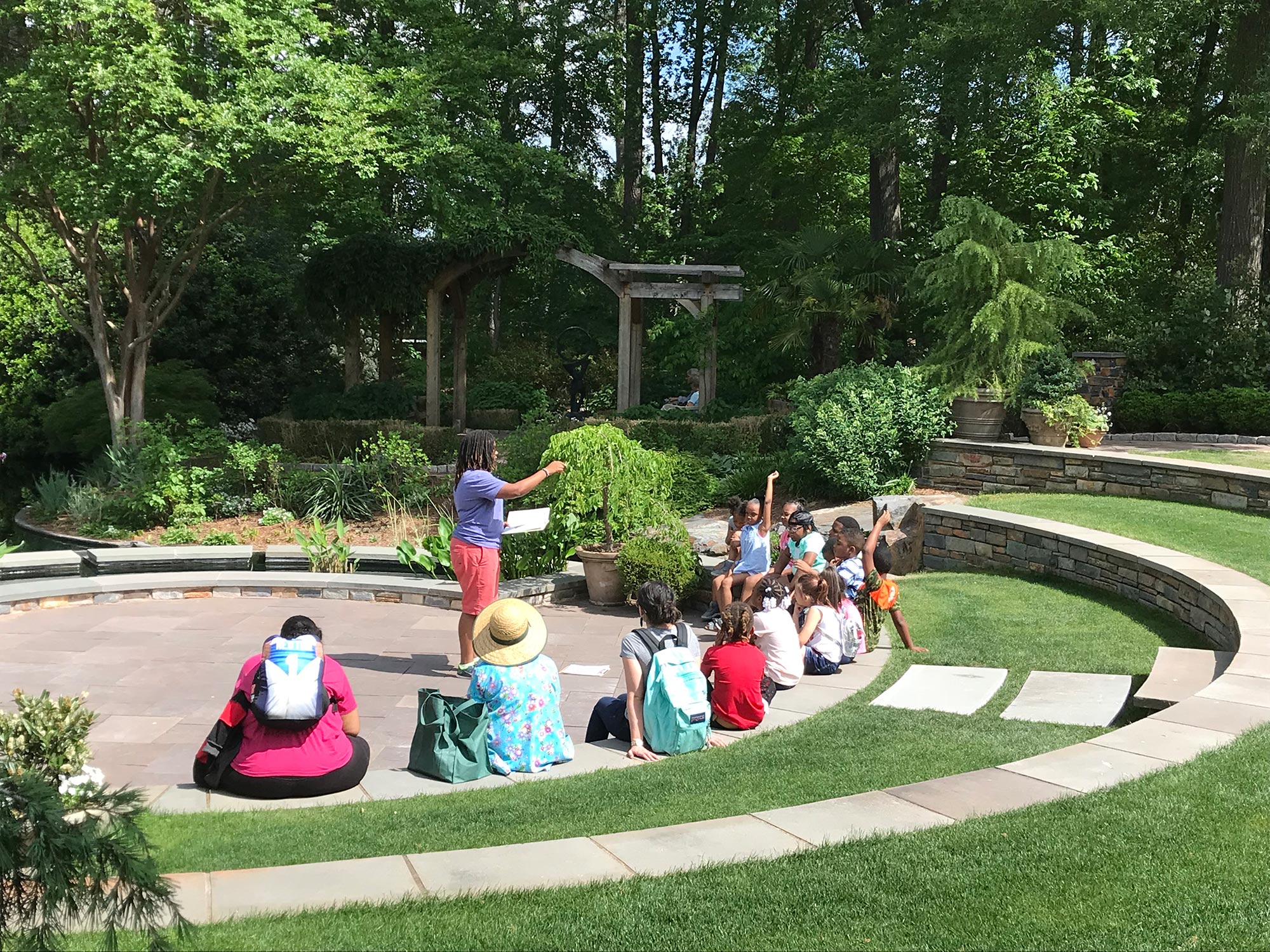Enhancing the Student Experience
Duke Divinity School graduate student Sam Aldave talks about how his work-study experience at Duke Gardens has shaped his perspectives on education and life.
Hear some of Sam’s perspectives in the audio clips below.
learning through teaching
Sam Aldave
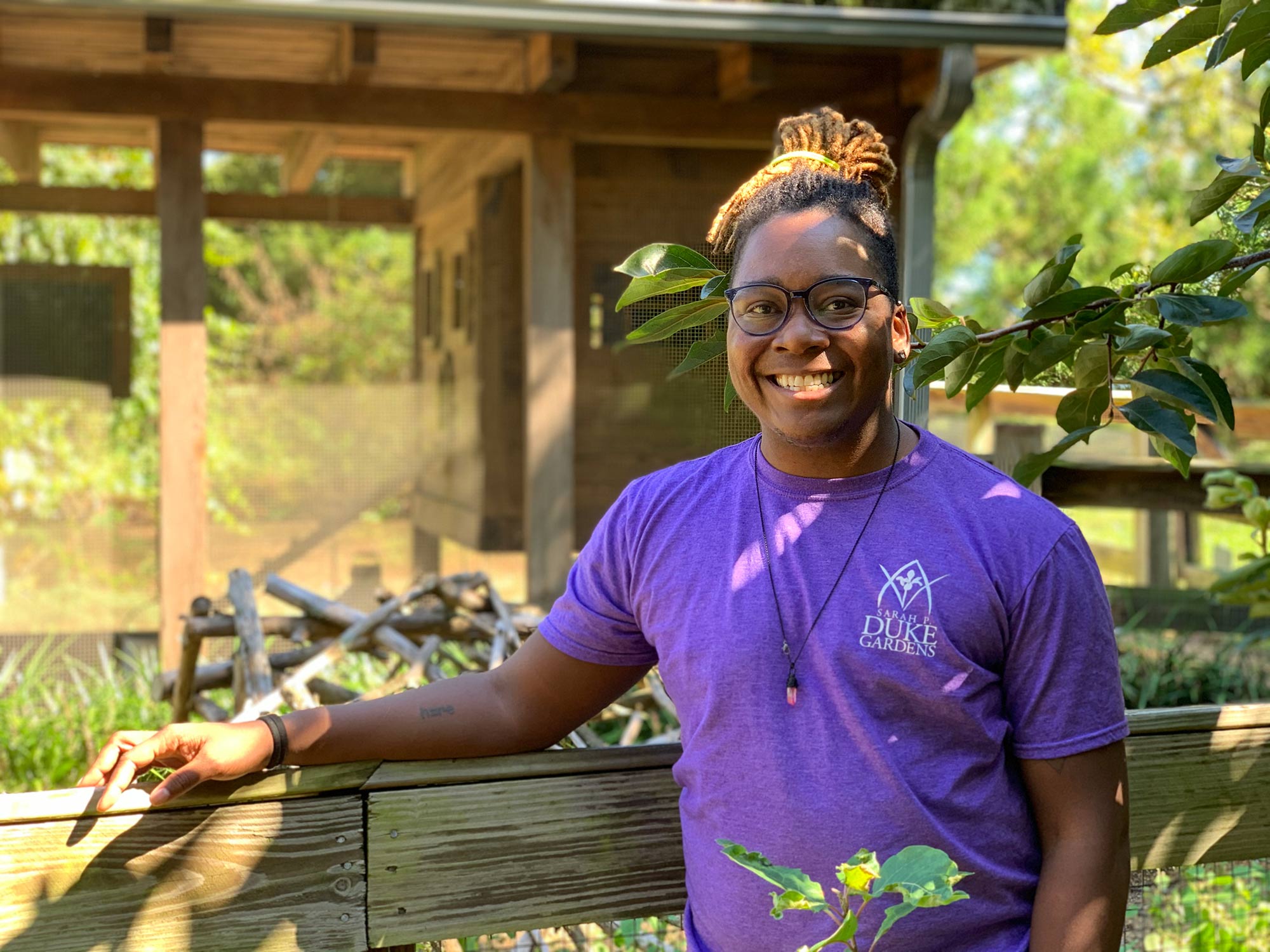
learning through teaching
Sam Aldave

Duke Divinity School graduate student Sam Aldave talks about how his work-study experience at Duke Gardens has shaped his perspectives on education and life.
Hear some of Sam’s perspectives in the audio clips below.
Teaching Versus Learning
read the transcript
When I first started working at Duke Gardens, it was during my first year of Divinity School at Duke. And I thought that there would be a very clear delineation of my roles between school and at work. I thought that when I went to work at the Gardens in the education department, I would be teaching, so I would put on my teacher’s hat and teach. And when I was in school at the Divinity School, I would be learning, so I would take off my teacher’s hat and put on my learner’s hat and take in all of the information that there was. But after being at Duke Gardens for just a couple of weeks, I realized that it was a place where I would be able to both teach and learn simultaneously, which was a pretty amazing insight.
Empowering Students
read the transcript
So before I worked at Duke Gardens, I was a classroom teacher for a number of years, and I often felt the need to be what they call a “sage on the stage.” Like, someone who knew all the information and could imbue my kids with an understanding of that information, so they could go forth and do well in the world. And once I started teaching at Duke Gardens, I realized just how much more agency students could handle in their own learning.
I started off by shadowing a couple of veteran docents andeducational leaders at the Gardens. And I remember just being a little shocked at first at how much autonomy and agency they were giving to the students during the classroom tours. But then I realized that through that process, the docents were allowing themselves to both simultaneously be teachers to the students and also learn from the students, and learn what the students already knew, and learn what the students were interested in,so that they could help to guide conversations in those directions. And that was pretty incredible to watchand actually see in action—students enjoying learning, and feeling like they weren’t just passive receptaclesof knowledge, but that they actually had something to bring to the
table and to offer as they learned. And that really drastically changed my teaching style and my approach to teaching.
Models of Teaching
read the transcript
Since beginning to work at the Gardens and having the opportunity to see teaching and learning happening simultaneously on the teacher end, I feel like I have been better able to come to a group of students who I’m going to be working with, and I’m more primed to listen and learn from them,and seek out what knowledge they are currently bringing to the table,and get a better understanding of what knowledge they wish to attain. Before working at the Gardens,I unfortunately didn’t have that much experience with seeing models of teaching where students actually had a lot of agency and autonomy. And so I replicated the models of teaching that I had seen, which was the teacher being the one with all the information who stands up and delivers that information to students. But I’m so fortunate for my time at Duke Gardens, because that has truly changed my approach to working withyoung learners and adult learners, and I feel that that will be very beneficial to me outside of the Gardens and long after I’m done working at the Gardens.
When You Don't Have Answers
read the transcript
Another wonderful thing about the approach to teaching and learning that I’ve gained from the Gardens is that it gets rid of some of the kind of shame or like embarrassment that teachers can sometimes feel when students ask questions that we don’t have the answers for. Because by setting up a learning environment in which everybody—teachers and students—are expected to be teachers and learners, it makes sense that the teacher wouldn’t have all the answers, and it’s OK, and feels more OK, in those situations, to say to a student, I don’t know the answer to that question, but let’s see if we can figure out some answers together. And that just positions the teacher to be even more of a support for the student without feeling some of the embarrassment or shame that can be typically felt when you are trying to be the “sage on the stage” with all the wisdom, and then someone messes you up by asking you a question that you don’t know the answers to.
Goals
read the transcript
Surprises
read the transcript
I came into my role at Duke Gardens expecting to teach a lot, but I never imaginedhow much I would learn about teaching and pedagogy. I expected to learn a lot about the outdoors, because I have never been a huge outdoors guy that’s just learned a lot about nature around me, but I was really pleasantly surprised—and have been really pleasantly surprised—at how much I’ve learned about teaching and pedagogy. And I’m just so thankful for the incredible role models that I have had to observe and learn from as I’ve gone about learning to teach in the Gardens.
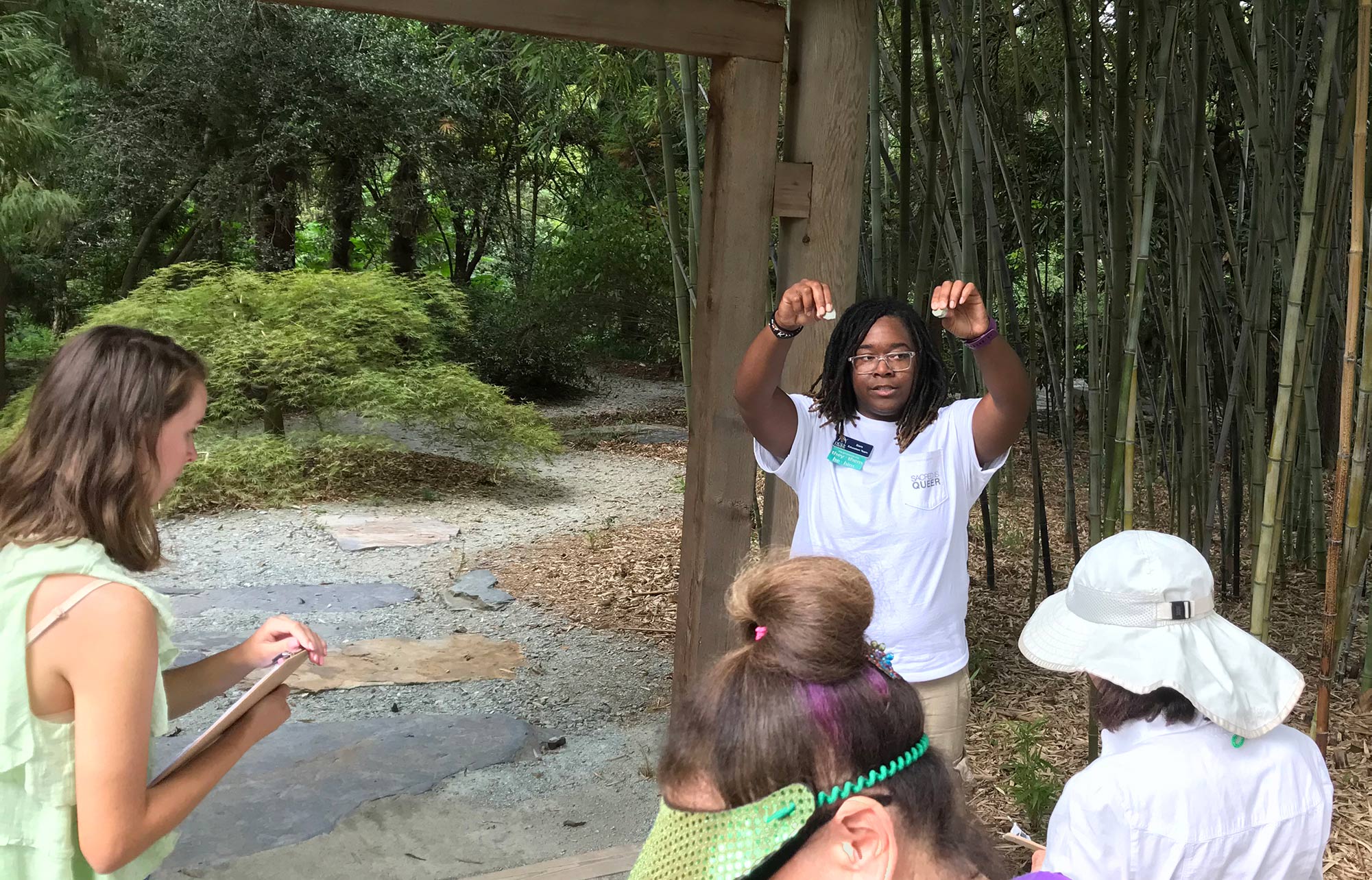
finding sanctuary
Grace Hooks
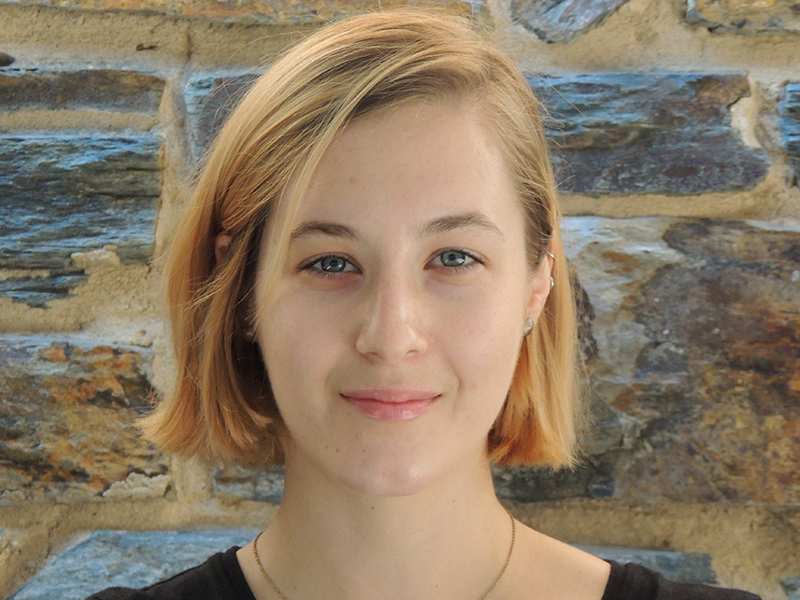
But there is beautiful satisfaction in the peace at Sarah P. Duke Gardens that transcends the thrill and intense pressure of cutting-edge research. The garden provides a sanctuary where the flora compels you to be nowhere else other than the present moment.
I delight in strolling through Duke Gardens in the evening after a full day of work in laboratories at Duke. The calm atmosphere of the garden and the rich beauty of nature is soothing and inspiring. I love taking a moment to refresh in the garden, where there are always koi swimming in the pond, always ducks floating on the lake, and always vibrant tree groves that are patient, steady and full.
Grace Hooks
Department of Biochemistry
Duke University School of Medicine
When I first came to Duke, I felt nervous, overwhelmed and, frankly, out of my league—a feeling I’m sure many first-year students share. I went from classes of 20 students in high school to lectures of up to 350 students, and I was now living on my own.
With such a large life transition, Duke Gardens served as a means of escape, enabling me to relax and put life back into perspective. This was thanks largely to the Fisher Amphitheater and the Hanes Iris Garden, both adjacent to West Campus. After my acceptance, when I toured Duke with my parents, we agreed that these two beautiful spaces would be ideal spots to do homework, read a book, listen to music, or come with friends if I were ever feeling overwhelmed.
Because of this shared discovery with my parents, both the amphitheater and the iris garden served as reminders of home. I would sit in the grass with a book and it immediately felt like I was closer to my family. Throughout my freshman year, I visited both of these spots at least biweekly, and it helped make me feel at home when I felt out of place or stressed.
My time in Duke Gardens has clarified for me how important it is for everyone to have a meaningful connection with nature and the world around us. Now more than ever, we need to reconnect and have tactile experiences with more than screens and walls, for the sake of our mental health. When Duke Gardens is able to safely reopen, I will be among the first to visit, and I look forward to sharing this valuable campus resource with my fellow students in the future.
Charles Shaffer
Class of 2023
Student Representative/
Duke Gardens Board of Advisors
seeking tactile experiences
Charles Shaffer
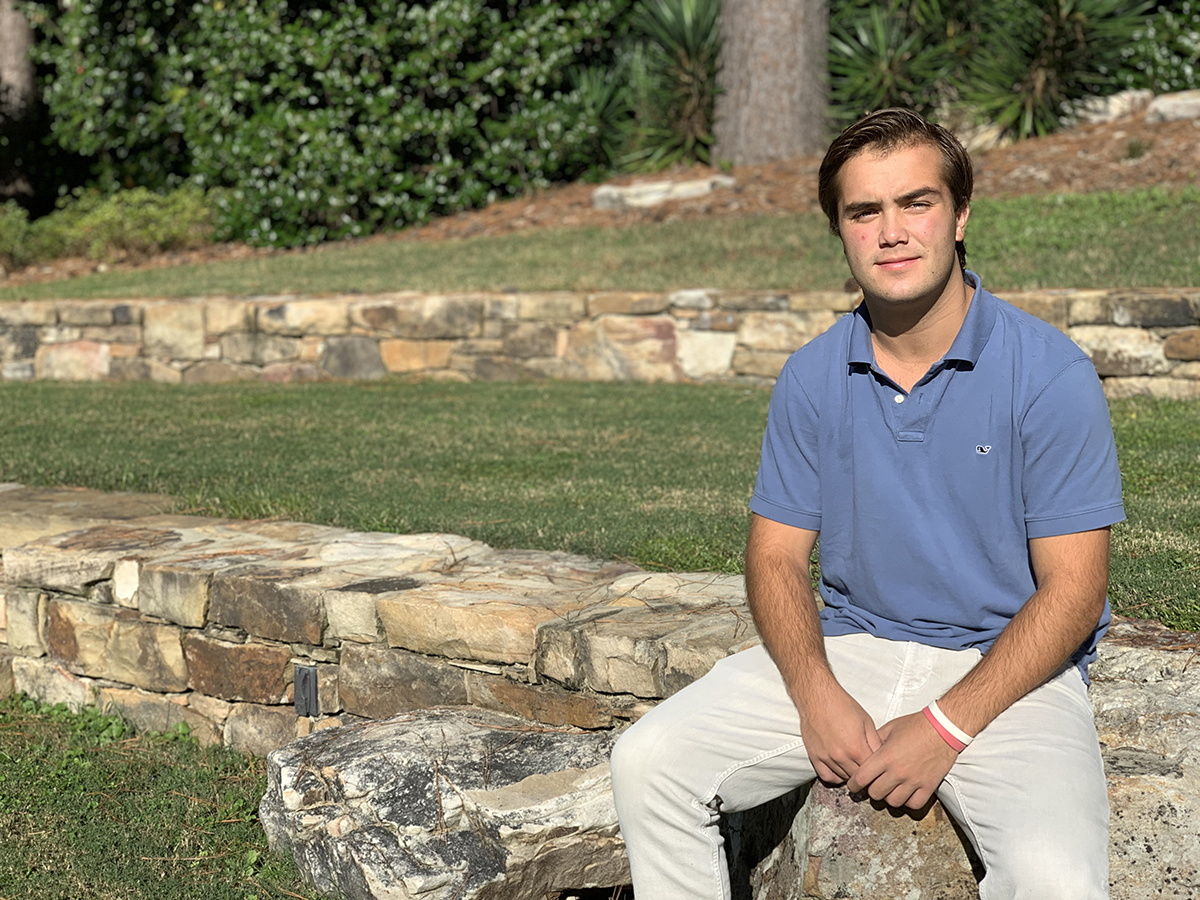
seeking tactile experiences
Charles Shaffer

When I first came to Duke, I felt nervous, overwhelmed and, frankly, out of my league—a feeling I’m sure many first-year students share. I went from classes of 20 students in high school to lectures of up to 350 students, and I was now living on my own.
With such a large life transition, Duke Gardens served as a means of escape, enabling me to relax and put life back into perspective. This was thanks largely to the Fisher Amphitheater and the Hanes Iris Garden, both adjacent to West Campus. After my acceptance, when I toured Duke with my parents, we agreed that these two beautiful spaces would be ideal spots to do homework, read a book, listen to music, or come with friends if I were ever feeling overwhelmed.
Because of this shared discovery with my parents, both the amphitheater and the iris garden served as reminders of home. I would sit in the grass with a book and it immediately felt like I was closer to my family. Throughout my freshman year, I visited both of these spots at least biweekly, and it helped make me feel at home when I felt out of place or stressed.
My time in Duke Gardens has clarified for me how important it is for everyone to have a meaningful connection with nature and the world around us. Now more than ever, we need to reconnect and have tactile experiences with more than screens and walls, for the sake of our mental health. When Duke Gardens is able to safely reopen, I will be among the first to visit, and I look forward to sharing this valuable campus resource with my fellow students in the future.

